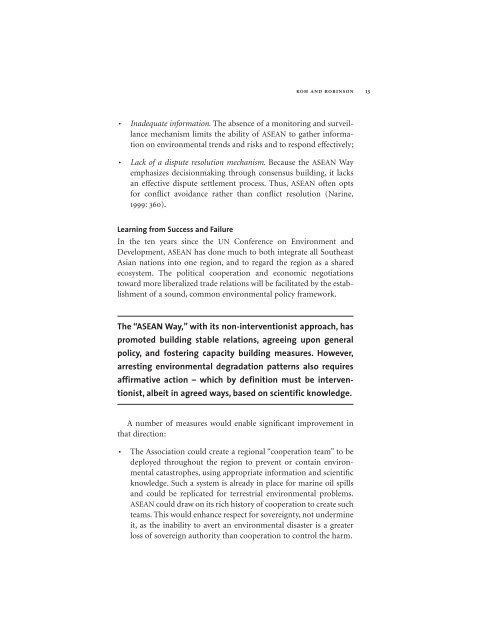Regional Environmental Governance: Examining ... - Yale University
Regional Environmental Governance: Examining ... - Yale University
Regional Environmental Governance: Examining ... - Yale University
Create successful ePaper yourself
Turn your PDF publications into a flip-book with our unique Google optimized e-Paper software.
KOH AND ROBINSON 13<br />
• Inadequate information. The absence of a monitoring and surveillance<br />
mechanism limits the ability of ASEAN to gather information<br />
on environmental trends and risks and to respond effectively;<br />
•<br />
Lack of a dispute resolution mechanism. Because the ASEAN Way<br />
emphasizes decisionmaking through consensus building, it lacks<br />
an effective dispute settlement process. Thus, ASEAN often opts<br />
for conflict avoidance rather than conflict resolution (Narine,<br />
1999: 360).<br />
Learning from Success and Failure<br />
In the ten years since the UN Conference on Environment and<br />
Development, ASEAN has done much to both integrate all Southeast<br />
Asian nations into one region, and to regard the region as a shared<br />
ecosystem. The political cooperation and economic negotiations<br />
toward more liberalized trade relations will be facilitated by the establishment<br />
of a sound, common environmental policy framework.<br />
The “ASEAN Way,” with its non-interventionist approach, has<br />
promoted building stable relations, agreeing upon general<br />
policy, and fostering capacity building measures. However,<br />
arresting environmental degradation patterns also requires<br />
affirmative action – which by definition must be interventionist,<br />
albeit in agreed ways, based on scientific knowledge.<br />
A number of measures would enable significant improvement in<br />
that direction:<br />
• The Association could create a regional “cooperation team” to be<br />
deployed throughout the region to prevent or contain environmental<br />
catastrophes, using appropriate information and scientific<br />
knowledge. Such a system is already in place for marine oil spills<br />
and could be replicated for terrestrial environmental problems.<br />
ASEAN could draw on its rich history of cooperation to create such<br />
teams. This would enhance respect for sovereignty, not undermine<br />
it, as the inability to avert an environmental disaster is a greater<br />
loss of sovereign authority than cooperation to control the harm.
















